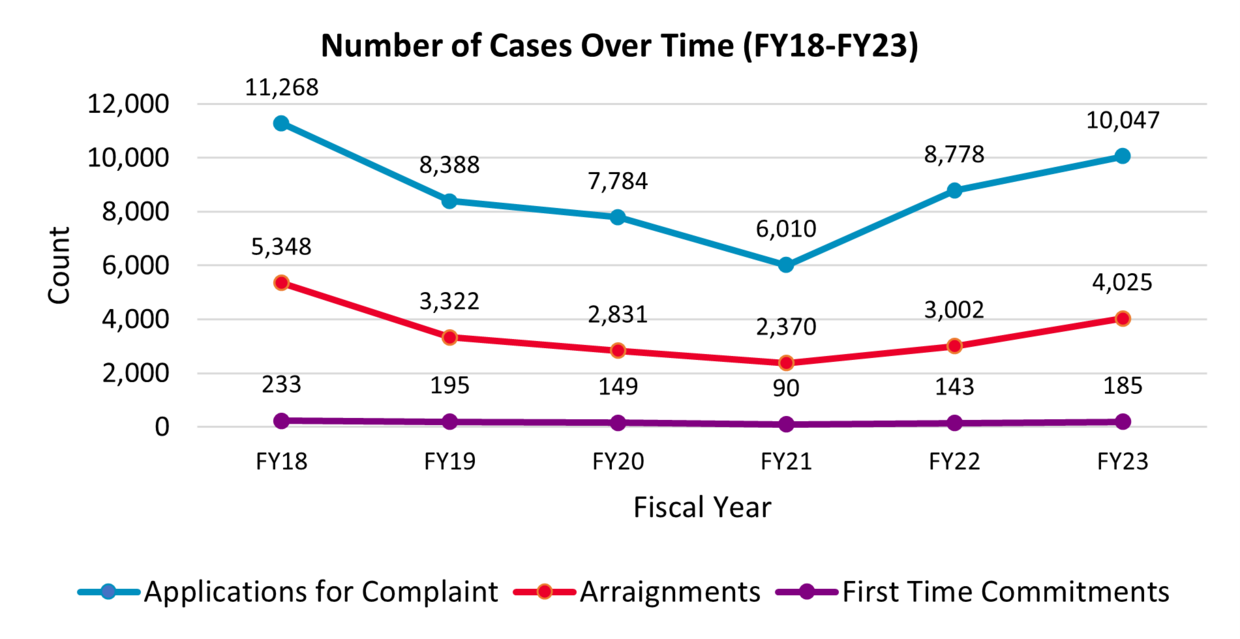- Office of the Child Advocate
Media Contact for Juvenile Justice Policy and Data Board Releases Report Highlighting Increased Use of Juvenile Justice System
Ari Fertig, Legislative and Communications Director
Boston, MA — The Juvenile Justice Policy and Data (JJPAD) Board released its annual report today, highlighting an uptick in the use of the juvenile justice system during Fiscal Year 2023 (FY23). Arrests and court involvement, especially for youth alleged of misdemeanor or lower-level offenses, rose compared to the year before.
The number of cases of youth entering and moving through the juvenile justice system in FY23 is still lower than it was prior to FY18 passage of the Criminal Justice Reform Act (CJRA), the landmark criminal justice reform law aimed at major reform of the adult and juvenile justice systems and reduced utilization of the juvenile justice system. However, if the recent rates of increase continue, system use will again reach pre-CJRA levels within the next two years.
“The insights gained from the JJPAD report require attention and action,” emphasized Maria Mossaides, Director of the Office of the Child Advocate. “There is more to be done to divert youth away from our juvenile justice system and provide the resources they need to be successful. Many of the youth involved in the juvenile justice system have unmet needs driven, in part, by the impacts of the pandemic among other factors. The Commonwealth needs to continue to support youth in their communities when they need resources to thrive.”
Of deep concern to the Board are persistent racial and ethnic disparities in our juvenile justice system. Black/African American and Latino/Hispanic youth face disproportionately higher rates of police arrests and applications for complaints (the first step of the Juvenile Court process) compared to their white counterparts, and these disparities persist throughout the juvenile justice process. The Board has documented these significant disparities in all previous reports. In FY23, these disparities slightly worsened at the initial stages of the juvenile justice process.
The Board is also concerned about data indicating that youth detained pretrial had higher rates of behavioral health needs, educational challenges, and trauma, including an increase in youth with current child welfare system involvement compared to last year.
The report urges immediate attention to address these challenges. Key recommendations include:
- increasing opportunities to divert youth away from the system;
- addressing policies (particularly those at the policing level) contributing to racial disparities; and
- improving support and access to services for youth with unmet needs.
“We need to reduce – not increase – the number of youth that are interacting with the juvenile justice system, particularly for low-level offenses. If we do that, we’ll see better life outcomes for the youth and improved public safety,” Melissa Threadgill, Senior Director of Policy and Implementation at the Office of the Child Advocate, said. “Research shows that diversion programs work: we can strengthen our communities, help youth thrive and reduce disparities at the same time by investing in diversion.”
The full report, detailing the Board's findings and recommendations, is available on the JJPAD website.
###
About the JJPAD Board
In April 2018, the Legislature passed An Act Relative to Criminal Justice Reform, which created the Juvenile Justice Policy and Data (JJPAD) Board under M.G.L. Chapter 119, Section 89. The Legislature charged the JJPAD Board with evaluating juvenile justice system policies and procedures, making recommendations to improve outcomes based on that analysis, and reporting annually to the Governor, the Chief Justice of the Trial Court, and the Legislature. The statute creating the JJPAD Board also placed a special emphasis on improving the quality and availability of juvenile justice system data. The Child Advocate chairs the JJPAD Board and the OCA provides staffing for the Board’s work.
https://www.mass.gov/juvenile-justice-policy-and-data-board
About the Office of the Child Advocate
The Office of the Child Advocate (OCA) is an independent agency that serves children and families across the Commonwealth. The Office’s goal is to ensure all children receive appropriate, timely and quality services. The OCA collects and analyzes data and makes recommendations to legislators and professionals to improve these services. The Office also takes complaints and provides information to families who receive state services. The Child Advocate chairs the JJPAD Board and the OCA provides staffing for the Board’s work. Learn more about the OCA.
https://www.mass.gov/orgs/office-of-the-child-advocate
###


